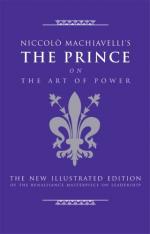|
This section contains 364 words (approx. 2 pages at 300 words per page) |
Machiavelli and Lao Tzu on Government
Machiavelli vs. Lao-Tzu
Perhaps the most distinct differences between Machiavelli's and Lao-Tzu's are their beliefs in how a government should be run. Whereas Machiavelli writes about the qualities a prince should have while instilling a totalitarian government, Lao-Tzu strongly believes that one cannot have total control, so everything should run its course.
Machiavelli believes that a government should be very structured, controlled, and powerful. He makes it known that the only priorities of a prince are war, the institutions, and discipline. His writings describes how it is more important for a prince to be practical than moral. This is shown where he writes, "in order to maintain the state he is often obliged to act against his promise, against charity, against humanity, and against religion" (47). In addition, Machiavelli argues that a prince may have to be cunning and deceitful in order to maintain political power. He takes the stance that it is better for the prince to be feared than loved. His view of how a government should run and his unethical conduct are both early signs of dictatorship.
Lao-Tzu's political philosophy falls into more of an individualistic and carefree branch of politics, in which the way of governing is by not forcing issues. He believes that the ruler should not act powerful, and because of this, he will be respected. Lao-Tzu also believes that the best leader is one that is loved, not feared. Instead of holding power and forcing rules, Lao-Tzu wishes to teach simplicity, patience, and compassions. He views the latter as "the greatest treasures" and if one has the three qualities, one will be a better person.
Although similarities between Machiavelli and Lao-Tzu may be difficult to detect, their views are both very extreme. Machiavelli believes that the prince should have total control and do anything to gain power; however, Lao-Tzu desires a political system in which everything runs its own course. There does not seem to be any middle ground written by the two authors which makes it difficult to believe that the aforementioned political systems could succeed. This makes the reader wonder if their political views were ever established and if so, how thriving it was.
|
This section contains 364 words (approx. 2 pages at 300 words per page) |


